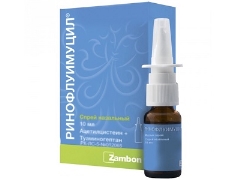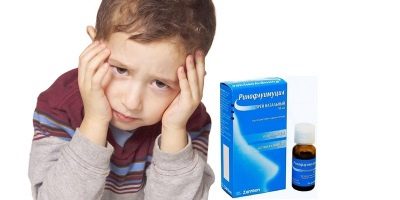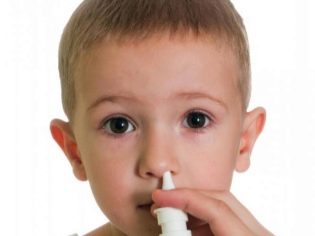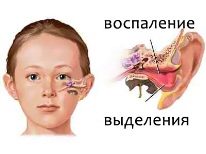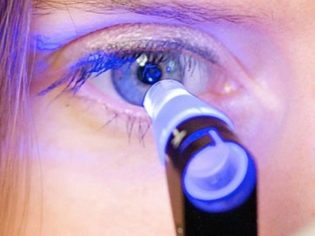Rinofluimucil for children: instructions for use
Rhinitis (rhinitis) causes a lot of trouble for both adults and children. This disease is especially dangerous for children, because difficulty breathing causes hypoxia, that is, lack of oxygen in the organs and tissues. To treat a runny nose in babies is fast and at the same time you need to use modern, effective and safe means.
Release form
"Rinofluimucil" is available only in the form of a nasal spray, which is sold in dark glass bottles with a special spray nozzle. The bottle has a volume of 10 ml.
The spray form is optimal for intranasal administration of the drug, especially in children, who, because of their age, often cannot perform the necessary retractor-swallowing movements. In this case, part of the drug flows from the nasal passages, and the effectiveness of the treatment decreases.
However, it is also dangerous to bury the medicine more than is recommended in the instructions for use: this can lead to an overdose and the corresponding symptoms. In addition, children often do not like to bury their medicines in the nose, because to do this you need to lie down and fix your head so that the medicine goes to its intended purpose.
In the same time the spray is easy to use because it is inserted upright in the nose, the child does not need to be laid down and taught to draw in liquid. The medicine from the nebulizer is evenly distributed throughout the nasal mucosa and immediately begins to work. In addition, a convenient nozzle with a dispenser ensures that only as much of the product as recommended by the doctor and the manufacturer of the medicine in the instructions gets into the child's nose.
It is convenient to use the spray at home, in the car, children's clinic, on the playground - wherever there is a need. The spray cap is protected from dust and other possible contamination.
Composition
The solution in the spray "Rinofluimucil" contains active and auxiliary components. Two substances are active: acetylcysteine and tuaminoheptana sulfate. Each 100 ml of solution contains 1 and 0.5 mg of these components, respectively.
Acetylcysteine has a mucolytic effect, therefore in the composition of the spray it contributes to the dilution of the contents accumulated in the nasal passages and lateral appendages and its removal.
Tuaminoheptan eliminates excessive redness and swelling of the nasal mucosa. This is a little-known and rather rarely used adrenomimetic, which has all the properties of substances that are actively used to produce anti-rhinitis. It constricts the blood vessels, reduces swelling and redness in the nasal cavity, facilitates breathing.
Due to the short period of action, tuaminoheptane is not used in the manufacture of monodrugs, that is, drugs with one active ingredient. In combination with acetylcysteine, Tuaminoheptan works efficiently, which accounts for the high therapeutic effect of Rinofluimucil spray.
Modern drugs are complex chemical compounds, so they include not only active ingredients, but also auxiliary components. These are mainly stabilizers and preservatives, which preserve the formula of the drug stable, and the drug is effective throughout the shelf life.
Rinofluimutsuil contains preservative disodium edetate, sodium dihydrogen phosphate — a buffer dietary supplement, 70% sorbitol — a sugar substitute, and benzalkonium chloride — an aseptic drug that also has antifungal effect, mint flavor, a small amount of ethanol and purified water.
Indications
Due to the unique combination of active ingredients, Rinofluimucil is prescribed for children with various types of rhinitis. The drug can be started to use immediately after a runny nose has appeared, as well as if the discharge from the nose becomes thicker and contains a purulent-mucous secret, and the child has a so-called yellow runny nose.
With a green head cold, i.e. when the discharge is painted in a greenish tint due to the presence in it of substances that the immune system produces to protect against infection or virus, Rhinofluimucil is no less effective.
It is important to use the drug in this case correctly, since the greenish color of the discharge indicates a serious course of the disease, the presence of a virus or infection in the body, the beginning of any complication.
This drug is prescribed not only for rhinitis, but also for:
- nasal congestion to prevent the disease from developing;
- in sinus - inflammation of the mucous membrane of the maxillary sinus;
- in adenoids, nasopharyngeal tonsil proliferation;
- with adenoiditis - diseases in which an increase and inflammation of the adenoids is accompanied by pain, fever, redness;
- with sinusitis - inflammation of the mucous membrane of one or several sinuses;
- with otitis media - inflammation of the middle ear as part of complex therapy.
Often these diseases follow one after the other or develop at the same time, since they are the result of a deep penetration of an infection or a virus into a child’s body.
In addition, the cough rhinofluimucil spray helps in cases when it occurs with active flow along the back wall of the goal, and in cases when the cause of the common cold is allergy. Allergens are also able to penetrate the nasal mucosa, irritate it, causing swelling and redness, resulting in congestion and runny nose.
Sometimes parents believe that a runny nose does not need to be treated, it will pass on its own. Rhinitis is a very common symptom of cold and flu, but this does not mean that a runny nose is a harmless condition. The fact is that difficulty breathing does not just reduce the quality of life of the child, who has to breathe through his mouth for a long time, which disrupts normal physiological processes, but also dries the oral mucosa and contributes to faster penetration of viruses into the body.
Difficulty breathing in the common cold can lead to the growth of tissues, for example, adenoids.
With nasal congestion, the child cannot breathe fully, less air enters his body, and therefore less oxygen, the lack of which in medicine is called hypoxia. This is a very dangerous condition that affects all organs and tissues of the body, but to a greater extent the brain and the heart.
Doctors recommend starting to treat a runny nose as soon as it appears, without waiting for complications. But this should be done properly and after consultation with the attending physician, who will prescribe adequate drugs to treat the child.
Spray better than drops, irrigates the mucous membrane, is able to stay longer in the nasal cavity and penetrate deeper. This greatly enhances its effect. "Rinofluimucil" narrows blood vessels and eliminates puffiness, neutralizes toxins that are released during the life of viruses and bacteria, and also dilutes the discharge, contributing to its rapid removal from the nasal cavity.
From what age is prescribed?
The instructions for use "Rinofluimucil" given a clear indication. This drug is used for children from the age of 3 years. This means that during clinical trials, Rinofluimucil was tested on children of appropriate age, and the manufacturer can guarantee not only the effectiveness, but also the safety of the treatment.
In young children, many physiological and biochemical processes in the body proceed differently than in adults or older children. Therefore, when using the drug to treat a small child, for example, at 2 years old, one cannot be sure of its absolute safety. This means that side effects are more likely to appear, which will aggravate the child’s condition, rather than ease it. In some cases, these effects can be quite strong, which will necessitate the hospitalization of the child.
In rare cases, for example, when sinus is neglected, the doctor may prescribe the use of "Rinofluimucil" to a child under 3 years old, but only for individual reasons and under the strict supervision of a doctor if the benefit of using the medicine exceeds the harm it causes.
If parents do not have the opportunity to consult with their doctor and there is no medicine on hand at the right children's dosage, there is no need to take risks and use the drug for another age group. In this case, it is better to use traditional methods for getting rid of a cold and use salt water for inhalation.
Contraindications
Like most drugs, Rinofluimucil spray has contraindications. They are associated with a possible negative effect if the child has any chronic disease or he takes other drugs.
So, the spray "Rinofluimucil" does not apply:
- when identified in the child's individual sensitivity to the components;
- in case of angle-closure glaucoma, congenital or acquired eye disease, in which the intraocular pressure is constantly increased;
- thyrotoxicosis, that is, an excess of thyroid hormones.
In some cases, these diseases occur in parallel. It is impossible to treat "Rinofluiucil" for a child of any age who takes MAO inhibitors and tricyclic antidepressants, as well as for 14 days after the last dose of these drugs.
In some chronic diseases, taking Rinofluimucil is allowed with caution. Most often this means that treatment must take place under the supervision of a physician. Such diseases include the manufacturer of bronchial asthma, chronic high blood pressure, angina.
Side effects
With proper administration of rhinofluimucil, side effects occur very rarely. Nevertheless, tuaminoheptan, which is one of the active ingredients of the drug, can cause undesirable effects such as an increase in pressure: children often complain of a headache that accompanies this condition. The child may experience anxiety, tremor of the limbs and head, tachycardia.
In addition, the drug is addictive, so you must comply with the duration of treatment prescribed in the instructions for use or follow a doctor's prescription.
In some cases, there is a local reaction in the form of dryness of the mucous membrane of the nose, mouth or throat, as well as skin allergic reactions. Frequent use of the drug can lead to urinary delays.
If a child has one or more of these symptoms, treatment with Rinofluimucio should be stopped and consulted with a doctor.
Perhaps these manifestations are not associated with drug treatment, then treatment can be continued. Otherwise, the doctor will advise how you can replace the medication with an analogue. It’s not worth picking up an analog, because a new drug may contain the same component to which the reaction appeared.
Sometimes the manifestations of side effects are quite strong, requiring not only the abolition of the drug, but also medical treatment.For example, if a child has an itch or a rash, the doctor will prescribe an antiallergic medication, and if the temperature has risen - a syrup with paracetamol.
Overdose
An overdose of rhinoflucilil can occur simultaneously or as a cumulative effect of a drug as a result of a longer intake than indicated in the instructions for use.
In the first case, the child may develop the same symptoms as with side effects, but more clearly and in a short period of time. The most correct action of the parents, if they find that the child has taken Rinofluimucil, seek emergency medical care.
Depending on the child’s individual characteristics, including age and body weight, there may be no obvious symptoms. However, you still need to show the child to the doctor, because "Rinofluimucil" has a vasoconstrictor effect and in large volumes can be dangerous for children.
In the second case, an overdose can not only lead to the development of the corresponding symptoms, but also cause addiction to the drug, that is, a condition in which new doses of medication do not have the desired effect on the child’s body.
If an overdose is suspected, the medication should be immediately stopped, call a doctor and consult about possible options for replacing the drug. Remember that it is often impossible to use "Rinofluimucil" for the treatment of children.
Instructions for use
Before first use, the spray must be removed from the packaging, remove the protective cap from the bottle itself, and then another one from the sprayer. The second cap must be retained and the sprayer must be closed again after using the spray. This will protect it from dust and dirt.
After that, you need to open the sprayer cap and press it several times until a spray appears, which will indicate that the spray is ready for use. The “Rinofluimucil” sprayer is equipped with a dosing unit, therefore one dose of the drug corresponds to one click on the sprayer.
The instructions for use contain a recommendation to prescribe the use of the spray 3-4 times a day as needed. Need to enter one dose of spray. The course of treatment is generally not more than 7 days and, upon the recommendation of a doctor, it can be extended.
Children up to 3 years old "Rinofluimucil" is used only on prescription of a doctor in the prescribed dosages. At age 6, you can begin treatment with Rinofluimucil as soon as a runny nose appears.
Interaction with other drugs
Many modern complex drugs for flu and colds, including nasal drops and sprays are incompatible with the use of MAO inhibitors and tricyclic antidepressants. These specific medications are prescribed to children extremely rarely; nevertheless, parents need to be careful and be sure to warn the doctor if another specialist prescribed antidepressants. If taken at the same time, the severity of side effects increases and the probability of their occurrence increases.
In addition, during clinical trials of "Rinofluimucil" its ability to significantly weaken the effect of drugs used at elevated pressure was revealed. In this way, spray not only can lead to an increase in pressure, but also level the effect of the lowering drug.
Terms of sale and storage
Spray "Rinofluimucil" is sold in pharmacies without a prescription. It can be stored closed for 2.5 years, but only if the following conditions are met: the air temperature should not be lower than 15 and higher than 25? С. If the bottle has been opened, then it can be used only for 20 days.
Do not use the drug after the expiration date.
Reviews
Numerous reviews of parents on the use of "Rinofluimucil" indicate the high efficacy of the drug, even with neglected or chronic rhinitis, sinus and other nasopharyngeal diseases, symptoms of which are nasal congestion.
Consumer confidence is a European manufacturer of the drug, and the popularity adds a low price. Spray in Moscow costs on average a little less than 300 rubles, and one bottle is enough for a weekly course of treatment. In addition, Rinofluimucil is suitable not only for children over 3 years old, but also for adults, so you can buy one medicine for the whole family.
"Rinofluimucil" has a pleasant mint smell, it does not taste bitter, therefore children use it with pleasure.
As an expert review of the use of vasoconstrictor drugs, which include "Rinofluimucil", you can cite the opinion of Dr. Komarovsky. Effective drugs for the treatment of rhinitis in children exist, it is a number of vasoconstrictor drugs. However, for safe use it is necessary to follow certain rules.
So, Dr. Komarovsky advises in any case do not exceed the recommended dosage and duration of treatment, since it can cause the development of addiction to the drug, use only special children's forms of drugs and remember that many vasoconstrictor drugs are contraindicated in young children.
Analogs
Analogs of "Rinofluimucil" for both active substances - acetylcysteine and tuaminogaptan - are absent. With this combination of active ingredients, only Rinoflolucil is produced.
However, nasal drugs that are analogues of drugs for therapeutic effects are quite widely represented in Russian pharmacies. Some of them are cheaper. These are drugs such as nasal drops “Adrianol”, “Vibrocil” in the form of drops, gel or spray, “Malavit Spray Reno”, “Rhinostop"," Evkasent ".
Also to the analogs of "Rinofluimucil" can be attributed the drug "Polydex, Which contains two antibiotics and has anti-inflammatory effects. However, before using antibiotics in children, a medical consultation is not only desirable, but necessary. Getting used to this group of drugs, caused by uncontrolled and often unnecessary use, can be severely affected during a serious illness, when antibiotic treatment does not give the desired effect. Use "Rinoluimucil" together with "Polydex" is contraindicated.
Another possible substitute for "Rinofluimutsilva" - the drug "Isofra". This antibacterial agent also contains an antibiotic, so despite its high efficiency, it is not necessary to apply it yourself. In addition, this medicine is not always effective, for example, in cases where a runny nose is caused by a viral infection. But also it is impossible to apply "Rinofluimucil" along with "Isofra".
Dr. Komarovsky will tell you about the common cold and the medications necessary for this in the next video.
